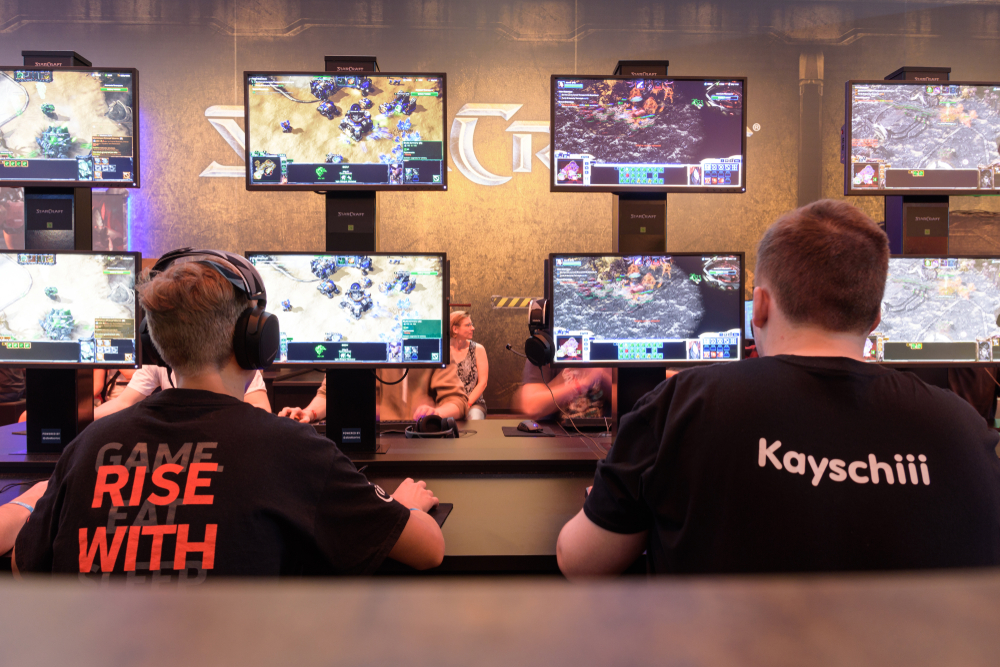Introduction
In a past era, the pulsating heartbeat of competitive gaming echoed through dimly lit arcades, where fervent enthusiasts huddled around clunky cabinets, testing their skills in pixelated realms. However, the relentless march of time has ushered in a profound metamorphosis, propelling competitive gaming into the forefront of a digital revolution in the phenomenon we now know as esports. This amalgamation of cutting-edge technology, unparalleled skill, and immersive entertainment has not only shattered the confines of those arcade walls but has birthed an entirely new frontier in global competition. Esports, with its magnetic appeal, has transcended the confines of screens and controllers to captivate audiences worldwide. As we fast-forward to the present, the very essence of sportsmanship finds itself redefined, as esports emerges as a cultural force that not only entertains but shapes the collective narrative of competitive prowess in the 21st century.
- The Digital Evolution
The digital revolution that has made gaming a popular form of entertainment is at the core of the esports revolution. Modern technology has made it possible for a generation of players to interact, participate, and watch on a worldwide level, especially with the widespread availability of fast internet and potent gaming consoles. Through the use of this connectivity, esports players from all over the world can compete fiercely across geographic boundaries. Esports have grown even more as a result of the emergence of streaming services such as Twitch and YouTube Gaming, which allow players to broadcast their gameplay to millions of viewers and foster a mutually beneficial relationship between them and their audience.

- A Multibillion-Dollar Industry
What was once a niche pastime has grown into a multibillion-dollar industry that draws funding from well-known athletes, big businesses, and celebrities. Prize pools for esports competitions are now on par with those of traditional sports championships. Games such as Counter-Strike: Global Offensive, League of Legends, and Dota 2 have become household names, and their professional players have become celebrities and secured lucrative sponsorship deals. The increased financial support for esports events has raised their production value to the level of traditional sports broadcasts, making them into grand spectacles. Modern venues, engrossing commentary, and innovative technology have elevated esports contests to immersive experiences for viewers, both in person and virtually.
- Breaking Stereotypes
Long-held misconceptions about gamers as lonesome people glued to their screens in isolation have been dispelled by esports. Because esports are competitive, professional teams and leagues have emerged, strengthening the bonds of camaraderie among players. These teams, which frequently represent cities or organizations, play in leagues that offer a structured environment similar to traditional sports, like the League of Legends Championship Series and the Overwatch League. Additionally, esports have developed into a route for ambitious gamers to pursue gaming professions. Today’s colleges and universities acknowledge the value of competitive gaming as a skill deserving of academic support, and offer esports scholarships. This change creates new opportunities for education and career advancement within the esports industry in addition to legitimizing it as a competitive sport.
- Global Spectacle and Cultural Impact
Esports has transcended from the world of screens and controllers to become a part of popular culture and a major global event. The growing influence of the esports industry has been highlighted by the Olympics Committee’s exploration of including the sport in upcoming Olympic Games. Major brands enthusiastically sponsor teams and tournaments, attesting to the cultural impact of this new form of entertainment. Esports events pack arenas to capacity. Esports’ inclusive and varied character has also added to its broad appeal. In contrast to traditional sports, which might have physical restrictions, esports accepts participants of all ages, genders, and skill levels. Prominent female gamers have risen as a result of this inclusivity, which has also challenged long-standing gender norms in the gaming community.

- The Future of Competition
As we peer into the future, it’s evident that esports is here to stay. The ongoing technological advancements, coupled with the ever-expanding global gaming community, will likely propel esports to even greater heights. Virtual reality, augmented reality, and innovations we can’t yet fathom may further redefine the landscape of competitive gaming.
Conclusion
To sum up, the rise of esports represents a paradigm shift in competitive gaming. From humble arcade setups, esports has grown to become a global phenomenon that has completely changed the face of sportsmanship. It has destroyed long-standing misconceptions about lonesome gamers while also creating a new frontier by bringing audiences and players together around a common sense of rivalry and friendship. Esports’ profound influence on the nexus of competition and entertainment is becoming more and more apparent as it continues to evolve. The direction of the sector is expected to influence the coming years and bear witness to the strength of digital innovation and the uniting influence of virtual competition on the international scene. Beyond the realm of gaming, esports is a dynamic force that is shaping a new era in how we view and interact with competitive entertainment as well as the larger cultural narrative.

